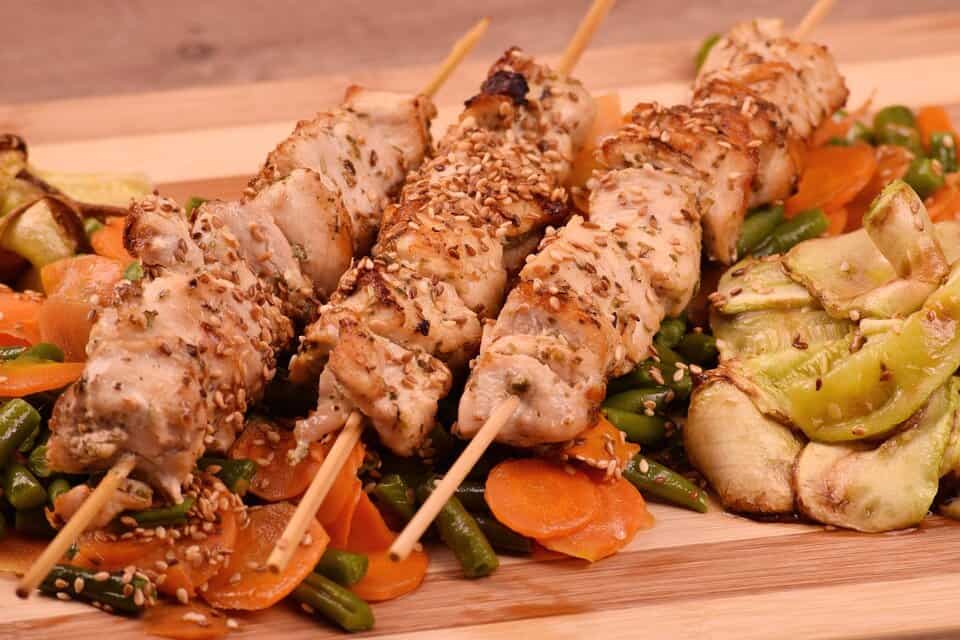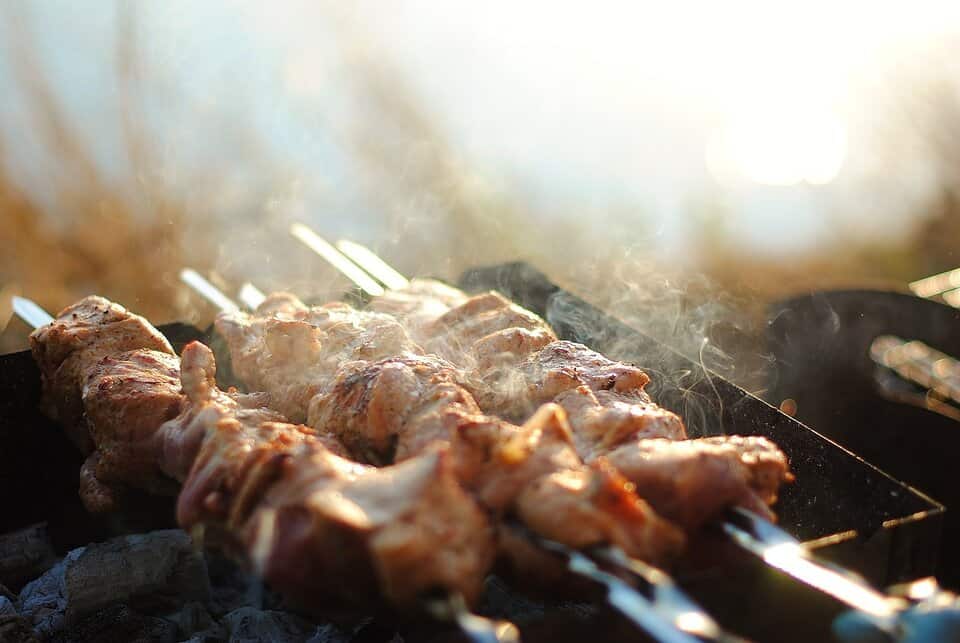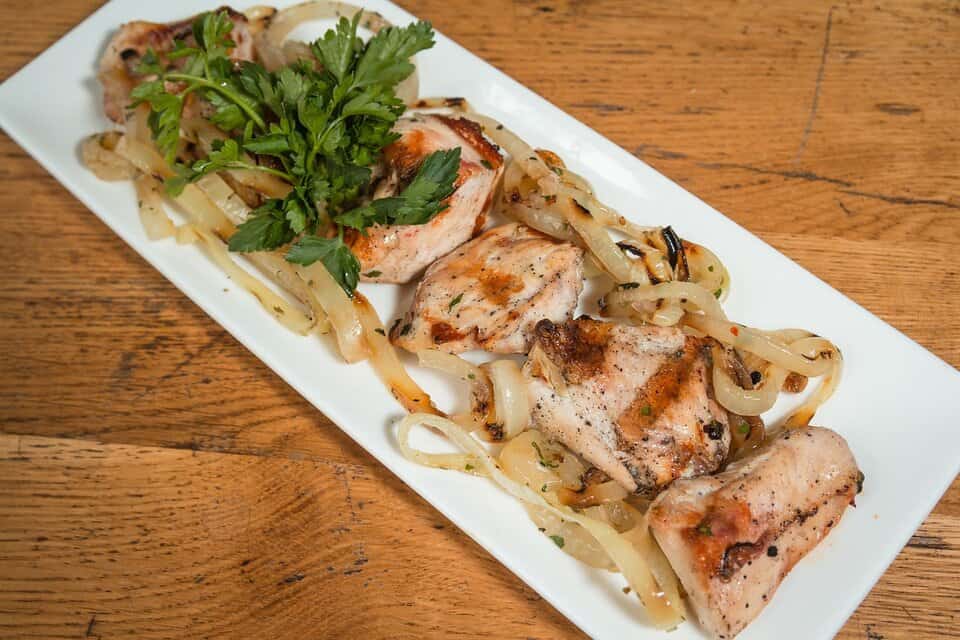Chicken kebabs are delicious. Let’s just be honest here – they’re great! There’s a reason that chicken kebabs are a popular fast food option found in many cultures throughout the world, and it’s not hard to see why. While they are often advertised as a healthier alternative to other fast food options, anyone who has looked up fast food numbers in the U.S. know that looks can be deceiving. So are chicken kebabs really good for you or are they are actually bad for you?
In this article, we will explore the nutritional content of chicken kebabs and provide a clear answer to the question of whether or not they are bad for you, taking into consideration that depending on what your goals are, the answer can be different.
When it comes to determining whether or not a chicken kebab is bad for you, it is important to consider a few different factors. First, the nutritional content of the chicken itself is important, as well as any marinades or sauces that may be used.
Additionally, the type and amount of vegetables included in the kebab can have an impact on its overall healthiness. Finally, it is important to consider the cooking method used, as some cooking methods can add unnecessary calories and fat.
By taking a closer look at these factors, we can gain a better understanding of whether or not chicken kebabs are a healthy choice. So, let’s dive in and explore the nutritional content of chicken kebabs and whether or not they are truly bad for you.

Chicken Kebabs Nutritional Information
Let’s start with the average nutritional information of chicken kebabs to get an overall look at what they bring to the table.
Calories
The number of calories in a chicken kebab can vary depending on the size and ingredients used. On average, a chicken kebab contains around 581 calories per serving. However, this can vary depending on the size of the kebab and the ingredients used. Sauces add calories, plain chicken means less.
The way the chicken kebabs are spiced and flavor added makes a difference, as does whether skin is kept on or if the chicken is skinless. How processed is it? This all matters, but generally speaking you get a LOT of chicken on a skewer or normal chicken kebab for the calories, making it very reasonable from the calorie standpoint of things.
Fat Content
The fat content in a chicken kebab can also vary depending on the ingredients used. Kebabs made with minced lamb usually have a higher fat content, closer to 20-25% fat. Chicken kebabs that use thighs and breast with the skin on contains around 22% fat per serving, and that’s the fattiest that a chicken kebab is going to get. Boneless skinless chicken breast, for example, will have even less fat.
This is assuming a skewer style of chicken kebab and not something like Doner Kebabs which have a ton of additives that would skew the numbers regardless of the type of meat that was used.
Protein Content
No surprise here that chicken kebabs thrive when it comes to protein. Chicken kebabs are a great and tasty source of protein, which is essential for building and repairing muscles. On average, a chicken kebab contains around 24% protein per serving, making it a good option for those looking to increase their protein intake.
There’s a reason athletes and body builders eat so much chicken – it’s a great muscle builder because of the protein.
Carbohydrate Content
The carbohydrate content in a chicken kebab can vary depending on the ingredients used and the type of kebab. If you have a Doner Kebab with bread or pita bread that adds a lot of carbs while a skewer style kebab has very few. On average, a chicken kebabs have very few carbs, meaning if you’re avoiding them they’re a good choice.
For pita bread style chicken kebabs the carbs can be up to 50% of the daily amount – so the difference between the two is not small.
Sodium Content
Is there is one “hidden” common drawback, it’s that chicken kebabs are often high in sodium, which can be a concern for those with high blood pressure or other health issues.
On average, a chicken kebab contains around 1,500mg of sodium per serving, which is more than half of the recommended daily intake for adults. This is one of those major issues that can cause problems even when the rest of the nutritional stats look good.
Health Implications
There are a few major points to look at when it comes to how chicken kebabs can affect your health. Some of these are major concerns while others are the types that can become an issue with extended exposure over long periods of time.
Processed Meat
Chicken kebabs are considered processed meat, which means they are typically high in preservatives and additives. Processed meats have been linked to various health issues, including heart disease, type 2 diabetes, and certain types of cancer.
The World Health Organization (WHO) has classified processed meat as a Group 1 carcinogen, meaning that it is known to cause cancer in humans, so how the chicken is processed and prepared for the kebab makes a huge difference in how much of a concern this is, but the less processed, the better.
Saturated Fat
Chicken kebabs can also be high in saturated fat, which can increase your risk of heart disease and stroke. Saturated fat is found in animal products like meat and dairy, as well as in some plant-based oils like coconut and palm oil. Consuming too much saturated fat can lead to high cholesterol levels, which can contribute to the development of heart disease.
How dangerous the saturated fat depends on whether the animals were treated with antibiotics or not, but in most cases the meat will be at least somewhat processed and you honestly will rarely have the ability to know this information unless you controlled all the food going into the kebabs yourself.
Sodium Intake
Chicken kebabs can also be high in sodium, which can contribute to high blood pressure and an increased risk of heart disease. Small amounts of salt aren’t bad as people need salt, but in modern society almost everyone gets too much sodium and that’s bad.
Sodium is added to processed meats because they do two things:
- They preserve the food allowing it to last much longer without going bad
- They increase the taste and flavor of the chicken itself.
This means that eating a lot of chicken kebabs can throw your numbers way above the American Heart Association’s recommendations of 2,300 or less milligrams of sodium per day. And unlike fat or calories, excess sodium isn’t so easy to get out of the body from extra walking or exercise.
This is most consistently the largest concern with chicken kebabs from a health standpoint and figuring out whether or not they are bad for you.
Cancer Risks
Consuming processed meats like chicken kebabs has also been linked to an increased risk of certain types of cancer. The WHO has classified processed meat as a Group 1 carcinogen, meaning that it is known to cause cancer in humans. Eating just 50 grams of processed meat per day, which is roughly equivalent to one chicken kebab, has been associated with a 16% increased risk of colorectal cancer.
It’s worth noting that this doesn’t make chicken kebabs less healthy than any other processed meats whether ground beef turned into burgers or fast food, but while chicken kebabs might have the same risk it’s generally to a lesser extent and for chicken kebabs done skewer style from chickens raised hormone and antibiotic free, the risk is far lower.

Preparation and Cooking Methods
When it comes to kebabs, the preparation and cooking methods can greatly affect their nutritional value. Here are some tips to make sure your chicken kebab is as healthy as possible:
- Choose lean cuts of chicken as opposed to fatty, preferably skinless if possible.
- Marinate the chicken in a mixture of herbs, spices, and citrus juice to add flavor without adding extra fat or calories.
- Use a grilling method instead of frying for a healthier overall option
- Preheat the grill and brush it with oil to prevent the chicken from sticking.
- Skewer the chicken with plenty of vegetables, such as bell peppers, onions, and zucchini, to add fiber, vitamins, and minerals to the dish.
It is also important to make sure the chicken is cooked thoroughly to avoid the risk of foodborne illness. According to a study published in the Journal of Food Protection, raw meat used in kebabs can be contaminated with harmful bacteria, so it is crucial to cook the chicken to an internal temperature of 165°F (74°C) before serving.
Overall, with the right preparation and cooking methods, a chicken kebab can be a healthy and delicious meal option. Just be mindful of the ingredients you use and make sure the chicken is cooked thoroughly to ensure food safety.
Healthier Alternatives to Chicken Kebabs
If you’re looking for a healthier alternative to chicken kebabs, there are a few options you can consider:
Grilled chicken breast: Grilled chicken breast is a great alternative to chicken kebabs. It’s a lean source of protein and can be seasoned with a variety of herbs and spices for added flavor.
Vegetable skewers: Vegetable skewers are a delicious and healthy alternative to chicken kebabs. You can use a variety of vegetables such as peppers, onions, zucchini, and mushrooms, and season them with olive oil, salt, and pepper.
Salmon skewers: Salmon is a great source of omega-3 fatty acids and is a healthy alternative to chicken kebabs. You can marinate the salmon in a mixture of olive oil, lemon juice, garlic, and herbs before grilling it on skewers.
When grilling any type of skewer, it’s important to use lean protein sources and to avoid using too much oil or high-calorie sauces. You can also experiment with different marinades and seasonings to add flavor without adding extra calories.
Remember, just because you’re trying to eat healthy doesn’t mean you have to sacrifice flavor. With a little creativity, you can enjoy delicious and healthy meals that will satisfy your taste buds and your body.

So What’s the Verdict on Chicken Kebabs?
Chicken kebabs can be a healthy food option if prepared in the right way. Char-grilled or roasted kebabs are good for a cheat day as they are low in fat and calories when compared to other meats. Chicken is also a good source of protein, which helps build and repair muscles. It is low in fat and calories when compared to other meats such as beef or lamb.
However, it is important to be mindful of how they are prepared. Avoid using oils, as this can add unnecessary calories and fat to the dish. It is also important to be mindful of the portion size. Eating too much of anything, even healthy food, can lead to weight gain.
Having the occasional chicken kebab is perfectly fine and can be a very good part of a balanced diet especially as chicken tends to be a better option than red meat or even other types of white meats. Because of that, this is one of the best options if you’re going to have a kebab, especially short of a pure veggie or salmon/fish skewer.
If you’re looking for some extra protein to fuel your workouts or bulk up with muscle then chicken kebabs can be a great choice, but moderation is always a good thing.
In conclusion, chicken kebabs can be a healthy food option when prepared properly and consumed in moderation. It is important to be mindful of the portion size and avoid using oils when preparing them.
Other Kebab Articles You May Enjoy
